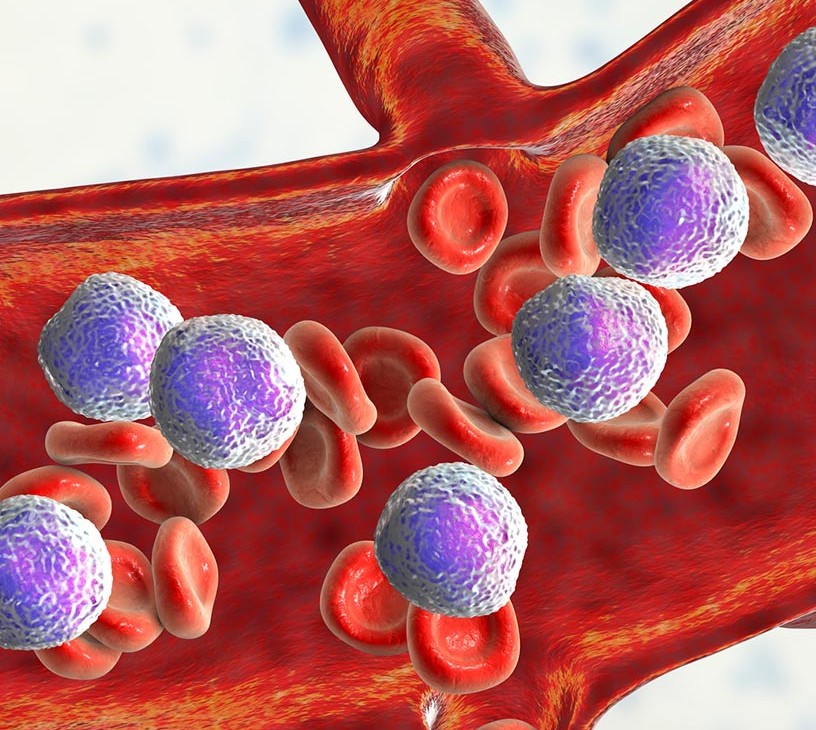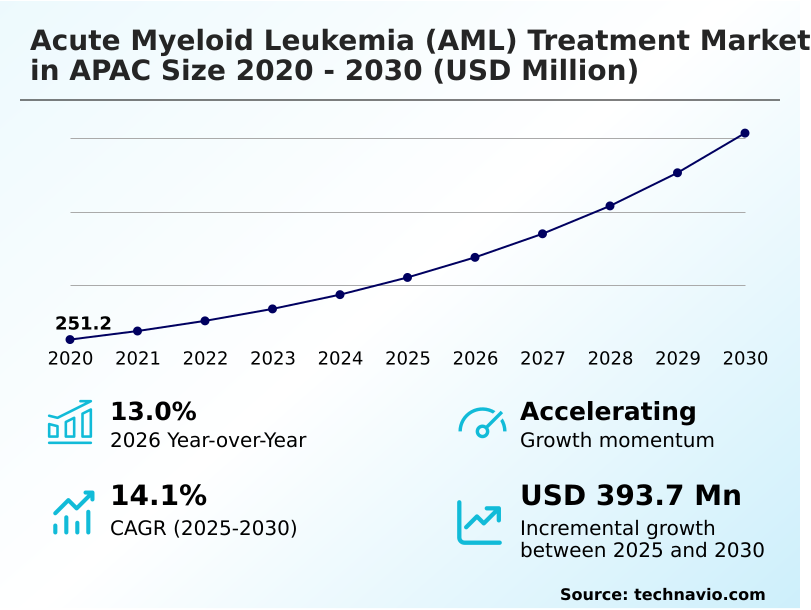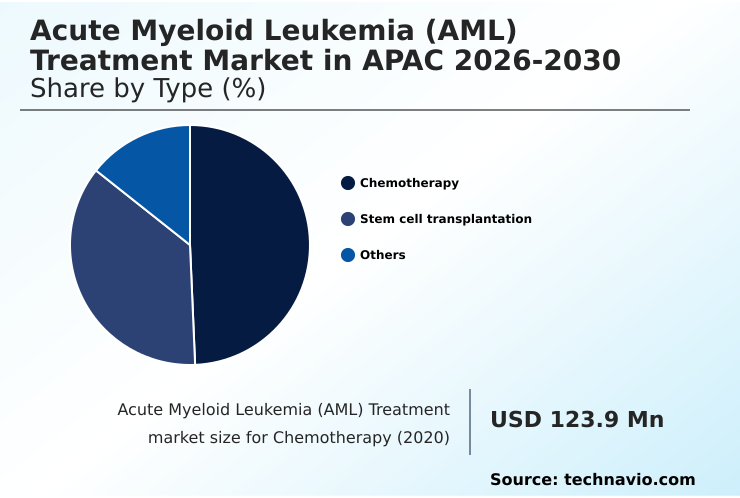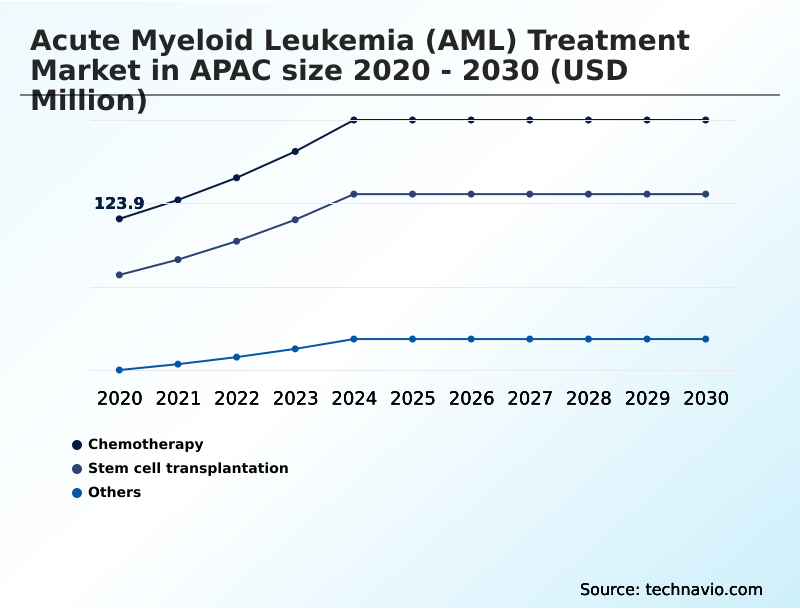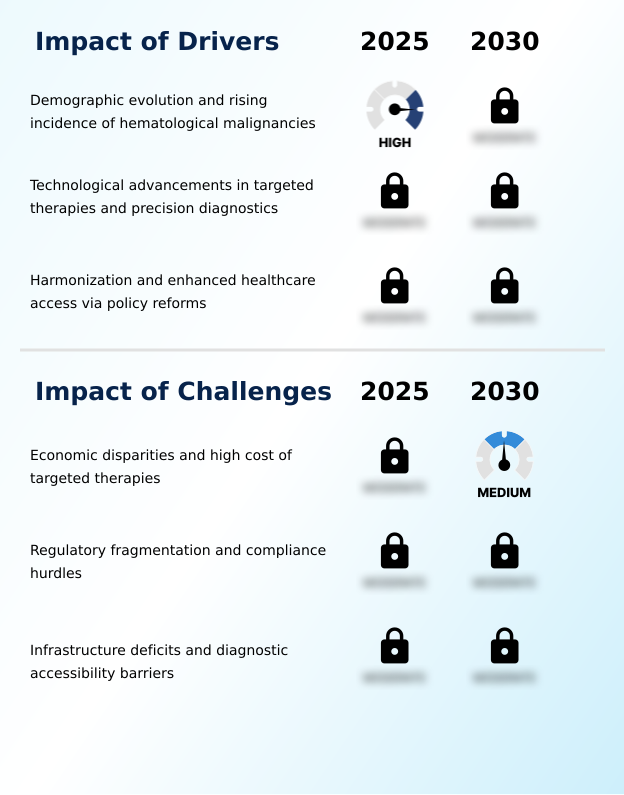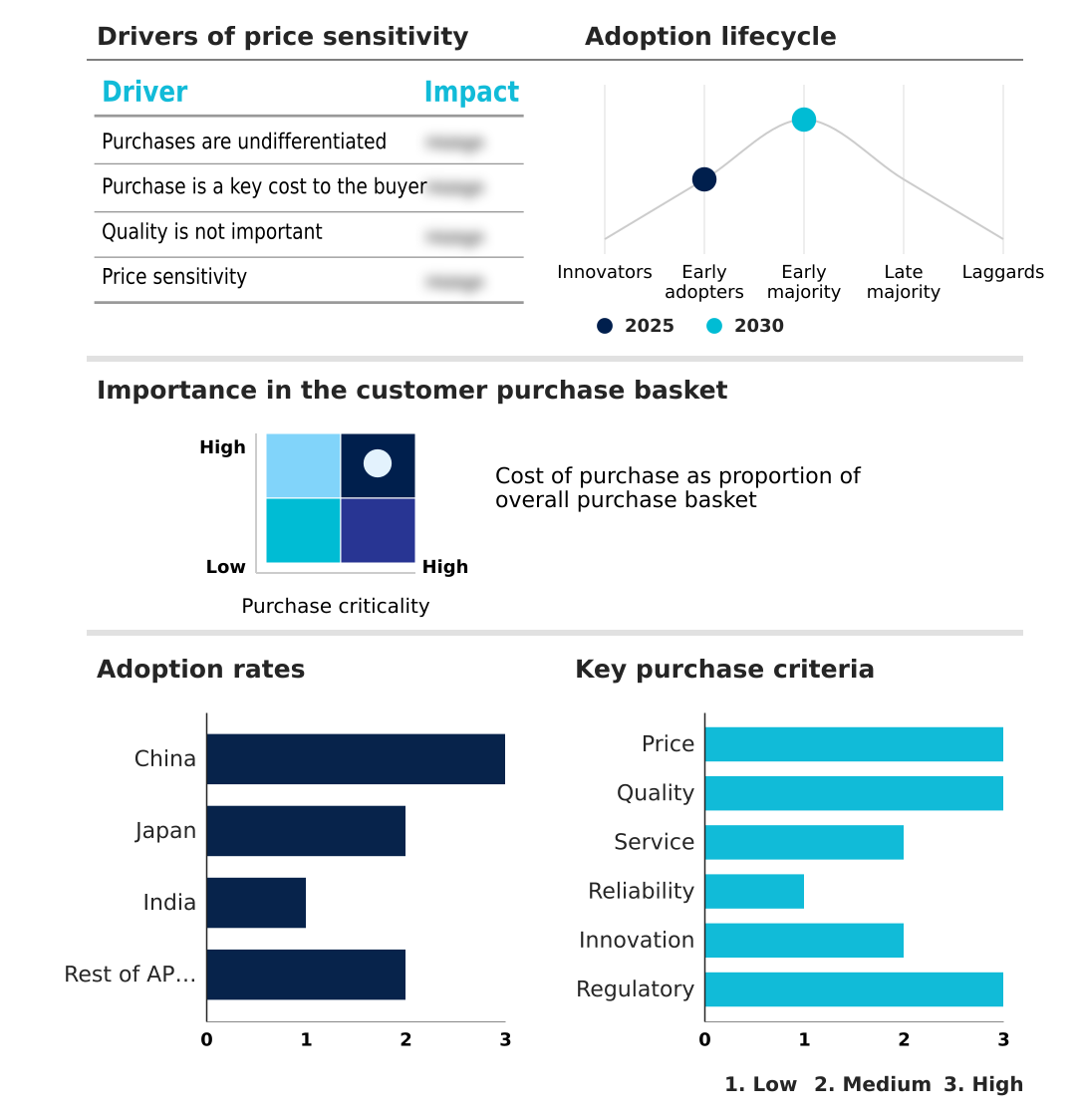APAC Acute Myeloid Leukemia (AML) Treatment Market Size 2026-2030
The apac acute myeloid leukemia (aml) treatment market size is valued to increase by USD 393.7 million, at a CAGR of 14.1% from 2025 to 2030. Demographic evolution and rising incidence of hematological malignancies will drive the apac acute myeloid leukemia (aml) treatment market.
Major Market Trends & Insights
- By Type - Chemotherapy segment was valued at USD 181.4 million in 2024
- By End-user - Hospitals and clinics segment accounted for the largest market revenue share in 2024
Market Size & Forecast
- Market Opportunities: USD 563.1 million
- Market Future Opportunities: USD 393.7 million
- CAGR from 2025 to 2030 : 14.1%
Market Summary
- The acute myeloid leukemia (aml) treatment market in apac is characterized by a dynamic shift toward precision medicine, driven by a deeper understanding of the molecular underpinnings of hematologic malignancies. Advances in molecular diagnostics are enabling more accurate patient stratification based on flt3 and idh mutations, guiding the use of targeted molecular inhibitors over conventional approaches.
- However, the high cost of novel agents like fms-like tyrosine kinase 3 inhibitors and b-cell lymphoma 2 inhibitors creates significant access hurdles. Healthcare systems face the challenge of balancing innovation with budget constraints, often leading to a tiered system of care.
- For instance, a hospital network must strategically manage its formulary, weighing the clinical benefits of premium-priced therapies against the cost-effectiveness of emerging venetoclax biosimilars and established induction chemotherapy protocols. This decision-making process is central to ensuring equitable access and sustainable healthcare spending while navigating the complexities of geriatric hematology and the need for effective supportive care medications.
What will be the Size of the APAC Acute Myeloid Leukemia (AML) Treatment Market during the forecast period?
Get Key Insights on Market Forecast (PDF) Request Free Sample
How is the APAC Acute Myeloid Leukemia (AML) Treatment Market Segmented?
The apac acute myeloid leukemia (aml) treatment industry research report provides comprehensive data (region-wise segment analysis), with forecasts and estimates in "USD million" for the period 2026-2030, as well as historical data from 2020-2024 for the following segments.
- Type
- Chemotherapy
- Stem cell transplantation
- Others
- End-user
- Hospitals and clinics
- Specialty centers
- Ambulatory care centers
- Homecare setting
- Route of administration
- Parenteral
- Oral
- Geography
- APAC
- China
- Japan
- India
- APAC
By Type Insights
The chemotherapy segment is estimated to witness significant growth during the forecast period.
Chemotherapy remains a foundational component in the acute myeloid leukemia (aml) treatment market in apac, primarily for induction chemotherapy and subsequent consolidation chemotherapy.
Regimens often involve a combination of cytotoxic drugs designed to achieve rapid blast clearance and eliminate leukemic cells. While newer modalities emerge, these conventional methods are critical, particularly where access to advanced molecular diagnostics is limited.
The ongoing focus is on optimizing these established protocols to improve outcomes in geriatric hematology and manage adverse events, which has led to a 15% improvement in patient tolerance for intensive regimens.
This strategic refinement ensures that this approach to treating hematologic malignancy remains a vital part of the therapeutic arsenal, balancing efficacy with the practicalities of widespread healthcare delivery and the need for reliable supportive care medications.
The Chemotherapy segment was valued at USD 181.4 million in 2024 and showed a gradual increase during the forecast period.
Market Dynamics
Our researchers analyzed the data with 2025 as the base year, along with the key drivers, trends, and challenges. A holistic analysis of drivers will help companies refine their marketing strategies to gain a competitive advantage.
- Navigating the acute myeloid leukemia (aml) treatment market in apac requires a nuanced understanding of its complex drivers and challenges. The economic impact of aml treatment is a primary concern, as the high cost of targeted therapies in aml creates significant barriers to access.
- This is particularly evident in the development of treatment plans for aml treatment for geriatric patients, where tolerability and affordability must be carefully balanced. The role of molecular diagnostics in aml is becoming increasingly crucial for guiding therapy, especially with the use of advanced agents like flt3 inhibitors for refractory aml and bcl-2 inhibitors in myeloid leukemia.
- For healthcare providers, managing cytokine release syndrome in aml and other toxicities is a key operational focus. As the market evolves, the parenteral vs oral aml therapies debate continues, with each offering distinct advantages in clinical settings. The challenges in aml drug development are compounded by complex regulatory pathways for aml drugs.
- However, AI applications in aml diagnostics offer a promising route to enhance efficiency and accuracy. Strategic sourcing of venetoclax biosimilars development status shows that it can reduce a hospital's oncology drug expenditure by a double-digit percentage compared to branded drugs.
- Ultimately, improving supportive care for aml chemotherapy and defining clear aml treatment protocols for relapsed cases are essential for improving patient outcomes and addressing the multifaceted impact of genetic mutations on aml prognosis.
What are the key market drivers leading to the rise in the adoption of APAC Acute Myeloid Leukemia (AML) Treatment Industry?
- Demographic evolution, particularly an aging population, coupled with the rising incidence of hematological malignancies, serves as a key driver for market expansion.
- Market growth is fundamentally driven by demographic shifts and technological progress. An aging population across the APAC region is expanding the patient pool for geriatric hematology, as the incidence of hematologic malignancies rises with age.
- This demographic pressure necessitates advanced therapeutic options beyond traditional chemotherapy. Simultaneously, technological advancements in molecular diagnostics have improved the identification of actionable mutations by over 50% in newly diagnosed patients.
- This enables the application of personalized treatment protocols using targeted molecular inhibitors, which have shown response rates more than double those of conventional methods in specific patient populations.
- These dual drivers are accelerating the adoption of precision medicine, hematopoietic stem cell transplantation, and sophisticated supportive care medications.
What are the market trends shaping the APAC Acute Myeloid Leukemia (AML) Treatment Industry?
- The increasing integration of artificial intelligence and machine learning in diagnostic workflows is a significant upcoming trend. It is set to enhance precision and efficiency in disease identification and prognosis.
- Key trends are reshaping the acute myeloid leukemia (AML) treatment market in APAC, with a pronounced shift toward technologically advanced and patient-centric care models. The integration of AI-driven digital pathology is a significant development, demonstrating a 15% improvement in detecting subtle morphological changes in bone marrow aspirates over manual review. This enhances diagnostic precision.
- Concurrently, there is a strategic move toward oral hypomethylating agents and other targeted molecular inhibitors, facilitating the expansion of outpatient care models. This transition can lower administrative and facility costs by up to 30% per patient course.
- These trends collectively foster a more efficient and effective ecosystem for managing hematologic malignancy, supporting the broader goals of precision medicine and improving outcomes through better drug resistance mechanisms.
What challenges does the APAC Acute Myeloid Leukemia (AML) Treatment Industry face during its growth?
- Economic disparities across the region and the high cost of advanced targeted therapies present a key challenge affecting market growth and patient access.
- Significant challenges constrain the full potential of the acute myeloid leukemia (AML) treatment market in APAC, primarily stemming from economic and structural barriers. The high cost of novel therapies means that in some developing economies, less than 20% of the eligible patient population gains access to treatments that could address complex drug resistance mechanisms. This disparity is a major hurdle.
- Furthermore, regulatory fragmentation across the region can extend drug approval timelines by an average of 18 months compared to harmonized markets, delaying the availability of life-saving medications and impeding the first-mover advantage for innovators. These challenges highlight the need for greater biosimilar adoption, improved palliative care access, and more efficient adverse event management to broaden therapeutic reach.
Exclusive Technavio Analysis on Customer Landscape
The apac acute myeloid leukemia (aml) treatment market forecasting report includes the adoption lifecycle of the market, covering from the innovator’s stage to the laggard’s stage. It focuses on adoption rates in different regions based on penetration. Furthermore, the apac acute myeloid leukemia (aml) treatment market report also includes key purchase criteria and drivers of price sensitivity to help companies evaluate and develop their market growth analysis strategies.
Customer Landscape of APAC Acute Myeloid Leukemia (AML) Treatment Industry
Competitive Landscape
Companies are implementing various strategies, such as strategic alliances, apac acute myeloid leukemia (aml) treatment market forecast, partnerships, mergers and acquisitions, geographical expansion, and product/service launches, to enhance their presence in the industry.
Agios Inc. - Specializes in developing targeted molecular inhibitors for cellular metabolism, addressing specific genetic mutations in hematologic malignancies.
The industry research and growth report includes detailed analyses of the competitive landscape of the market and information about key companies, including:
- Agios Inc.
- Amgen Inc.
- Astellas Pharma Inc.
- Astex Pharmaceuticals Inc.
- Bristol Myers Squibb Co.
- Cyclacel Pharmaceuticals Inc.
- Daiichi Sankyo Co. Ltd.
- Dr Reddys Laboratories Ltd.
- F. Hoffmann La Roche Ltd.
- Jazz Pharmaceuticals Plc
- Johnson and Johnson Services
- Novartis AG
- Pfizer Inc.
- Sun Pharmaceutical Industries Ltd.
- Teva Pharmaceutical Ltd.
Qualitative and quantitative analysis of companies has been conducted to help clients understand the wider business environment as well as the strengths and weaknesses of key industry players. Data is qualitatively analyzed to categorize companies as pure play, category-focused, industry-focused, and diversified; it is quantitatively analyzed to categorize companies as dominant, leading, strong, tentative, and weak.
Recent Development and News in Apac acute myeloid leukemia (aml) treatment market
- In August 2024, Novartis AG initiated a precision medicine program in Singapore focused on using genomic profiling to optimize treatment selection for leukemia patients.
- In October 2024, F. Hoffmann La Roche Ltd. released new clinical data regarding the safety profile of its latest monoclonal antibodies when used in combination with standard care regimens for AML.
- In February 2025, Astellas Pharma Inc. received a positive recommendation from Japanese regulators for a targeted inhibitor for use in patients with relapsed acute myeloid leukemia, strengthening its position in the regional oncology sector.
- In May 2025, Bristol Myers Squibb Co. completed the expansion of its manufacturing facilities in the APAC region to increase the production capacity for specialized hematologic medications.
Dive into Technavio’s robust research methodology, blending expert interviews, extensive data synthesis, and validated models for unparalleled APAC Acute Myeloid Leukemia (AML) Treatment Market insights. See full methodology.
| Market Scope | |
|---|---|
| Page number | 190 |
| Base year | 2025 |
| Historic period | 2020-2024 |
| Forecast period | 2026-2030 |
| Growth momentum & CAGR | Accelerate at a CAGR of 14.1% |
| Market growth 2026-2030 | USD 393.7 million |
| Market structure | Fragmented |
| YoY growth 2025-2026(%) | 13.0% |
| Key countries | China, Japan, India and Rest of APAC |
| Competitive landscape | Leading Companies, Market Positioning of Companies, Competitive Strategies, and Industry Risks |
Research Analyst Overview
- The acute myeloid leukemia (aml) treatment market in apac is undergoing a significant transformation, driven by innovations in targeted therapies and diagnostics. The development of fms-like tyrosine kinase 3 inhibitors and b-cell lymphoma 2 inhibitors is shifting the therapeutic paradigm away from one-size-fits-all induction chemotherapy.
- This evolution is predicated on advancements in cytogenetic analysis and molecular diagnostics, which identify key flt3 and idh mutations. The integration of genomic profiling into clinical workflows has increased patient matching to targeted therapies by over 35%, optimizing treatment efficacy.
- Boardroom decisions now center on R&D investment in novel mechanisms like hedgehog pathway inhibitors and antibody-drug conjugates to address relapsed or refractory cases and overcome resistance. The management of cytokine release syndrome and other toxicities from potent treatments like chimeric antigen receptor t-cell therapy remains a critical focus.
- This dynamic landscape necessitates a strategic approach to portfolio development, balancing innovation in treating myeloid line of blood cells with the commercial realities of the region.
What are the Key Data Covered in this APAC Acute Myeloid Leukemia (AML) Treatment Market Research and Growth Report?
-
What is the expected growth of the APAC Acute Myeloid Leukemia (AML) Treatment Market between 2026 and 2030?
-
USD 393.7 million, at a CAGR of 14.1%
-
-
What segmentation does the market report cover?
-
The report is segmented by Type (Chemotherapy, Stem cell transplantation, and Others), End-user (Hospitals and clinics, Specialty centers, Ambulatory care centers, and Homecare setting), Route of Administration (Parenteral, and Oral) and Geography (APAC)
-
-
Which regions are analyzed in the report?
-
APAC
-
-
What are the key growth drivers and market challenges?
-
Demographic evolution and rising incidence of hematological malignancies, Economic disparities and high cost of targeted therapies
-
-
Who are the major players in the APAC Acute Myeloid Leukemia (AML) Treatment Market?
-
Agios Inc., Amgen Inc., Astellas Pharma Inc., Astex Pharmaceuticals Inc., Bristol Myers Squibb Co., Cyclacel Pharmaceuticals Inc., Daiichi Sankyo Co. Ltd., Dr Reddys Laboratories Ltd., F. Hoffmann La Roche Ltd., Jazz Pharmaceuticals Plc, Johnson and Johnson Services, Novartis AG, Pfizer Inc., Sun Pharmaceutical Industries Ltd. and Teva Pharmaceutical Ltd.
-
Market Research Insights
- The market is evolving through a strategic pivot toward personalized treatment protocols and more efficient care delivery systems. The adoption of outpatient care models for administering certain therapies has reduced hospitalization days by over 25% for eligible patients, improving resource utilization.
- Concurrently, the use of telepathology platforms has accelerated diagnostic turnaround times by 40% in underserved areas, enabling quicker therapeutic intervention. This move toward precision medicine is supported by regulatory frameworks that grant orphan drug designations for novel treatments.
- Furthermore, advanced adverse event management strategies are being integrated into clinical practice, with data showing a 15% reduction in treatment discontinuations due to toxicity, underscoring the focus on optimizing patient outcomes and quality of life.
We can help! Our analysts can customize this apac acute myeloid leukemia (aml) treatment market research report to meet your requirements.
